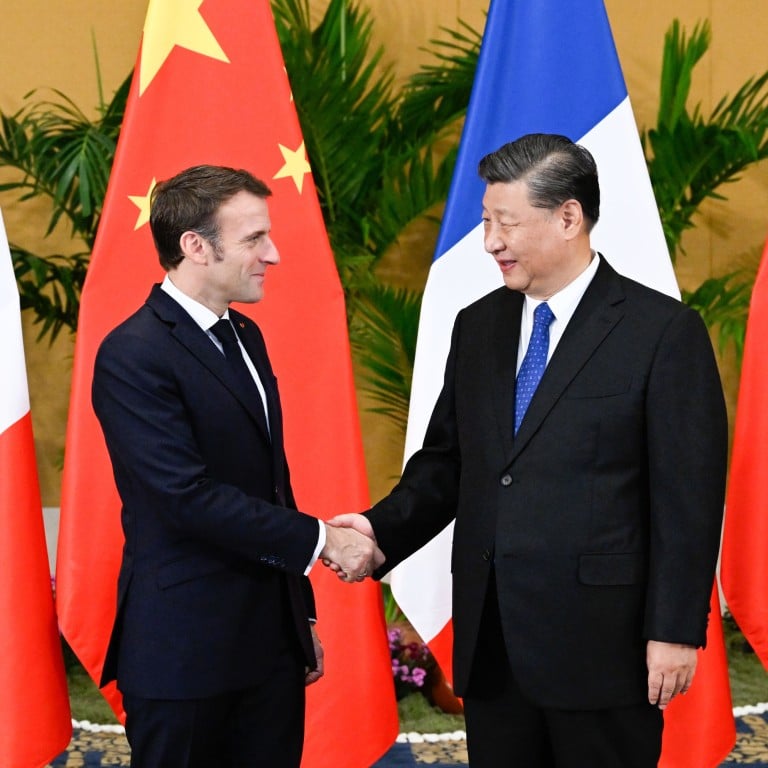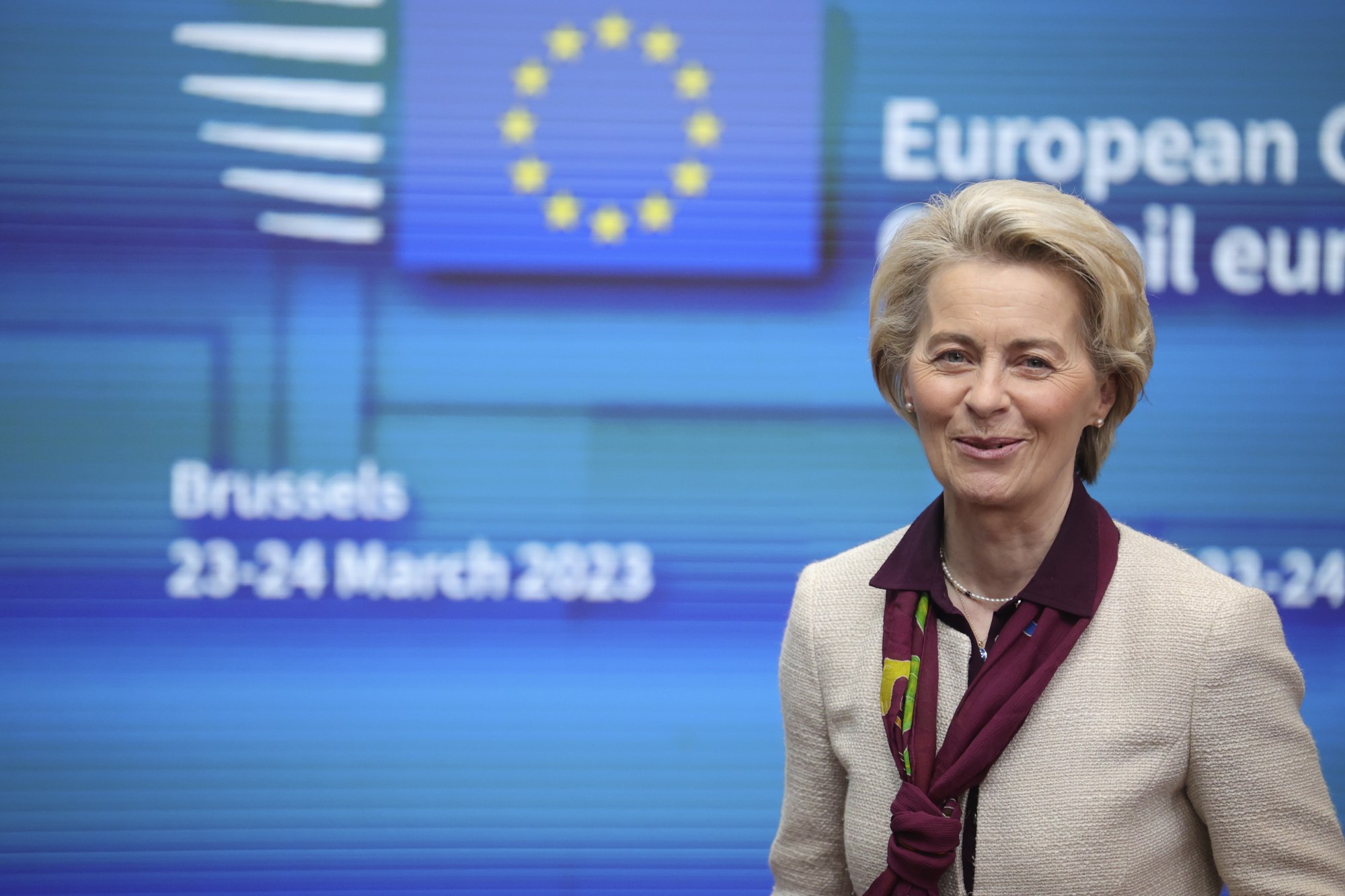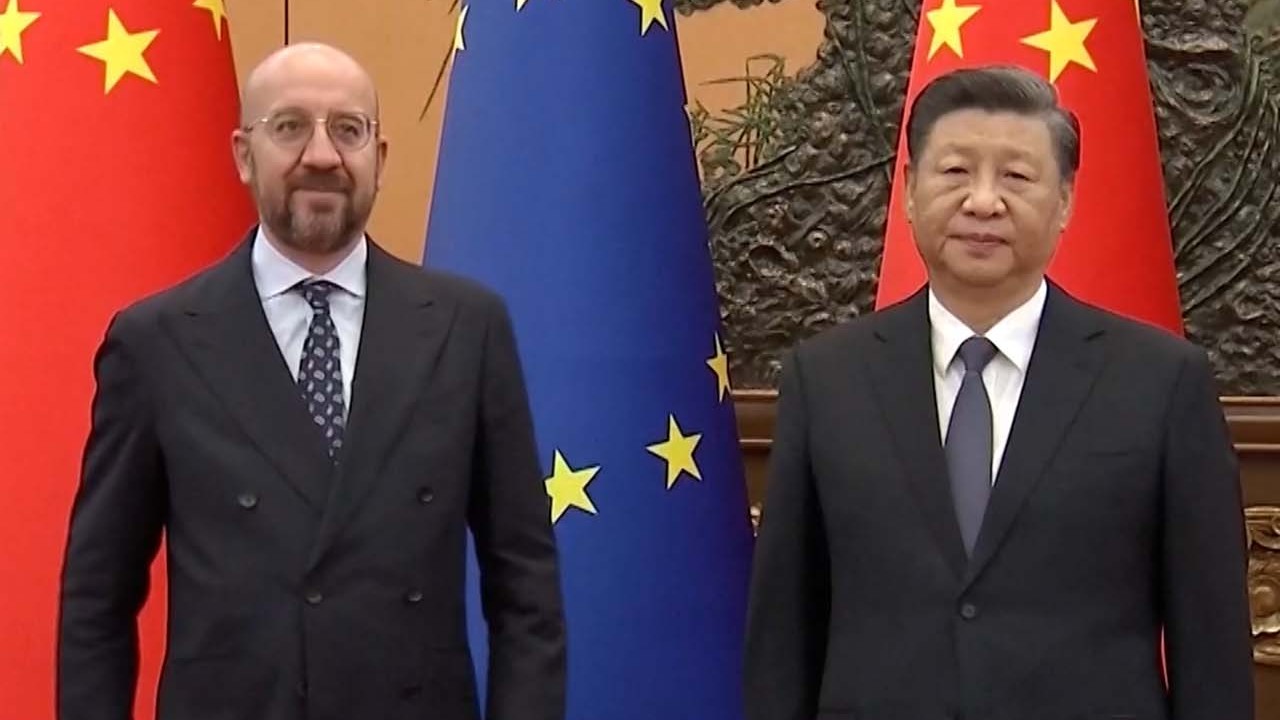
With a diplomatic flurry, European leaders will push China on peacemaking claim
- Leaders of Spain, France and the European Commission will travel to Beijing in coming weeks and repeat their calls that China not provide arms to Russia
- The Europeans will also try to gauge whether China is serious about assisting with peace efforts in Ukraine
European leaders are heading to Beijing in their droves to test for substance in China’s self-appointed status as a global peacemaker.
Spanish Prime Minister Pedro Sanchez will sit down with Chinese leader Xi Jinping this week. Next week, French President Emmanuel Macron and European Commission chief Ursula von der Leyen will follow suit.
Top EU diplomat Josep Borrell will head to Beijing – likely en route to the G7 foreign ministers summit in Japan on April 16 – for “strategic dialogue” with foreign minister Qin Gang.
Each will attempt to convince China not to provide arms to Russia, amid fears in Europe that such a move could help start World War III.
There is belief in Western European capitals that China wading in militarily would tip the balance permanently in Moscow’s favour, while it could also usher in a broader conflict involving Nato and the United States.
Government figures, speaking privately, also said that if the West did not continue to push China on the weapons issue, Beijing may believe it can get away with arming Moscow. “Xi is surrounded by ‘yes men’,” said one official. “He does not hear these things often enough.”
A Western European diplomat added that expectations about the trips were reasonably low, “but the very point of going and making these points in person makes them worthwhile”.
In Beijing, the Europeans will also try to gauge whether China is serious about assisting with peace efforts in Ukraine, said diplomats and experts. A position paper for peace published by the Chinese foreign ministry last month was immediately dismissed by von der Leyen and Borrell as being pro-Russia.
“We will look at the principles, of course, but we will look at them against the backdrop that China has taken sides,” von der Leyen said in February.
EU rejects Beijing’s ‘misplaced’ plan for peace in Ukraine
The assessment still stands for many officials behind the scenes, who are sceptical that China could broker peace when it is not seen as being neutral. But the language has softened in Brussels in recent weeks. Diplomats now talk about the plan as being “flawed” rather than a total waste of time.
They point to the fact that Ukraine has not totally rejected it, and that there is some overlap with Kyiv’s own vision to end the war. After his state trip to Moscow last week, some are waiting to see if Xi will now speak to Ukrainian leader Volodymyr Zelensky.
There is concern that continuing to criticise the plan will push Beijing even closer to Moscow, and also further alienate parts of the developing world that want to see an end to the war, even if it means Ukraine losing some territory.
“Some in the EU seem to be calculating that Europe would not gain that much by strongly dismissing Chinese position paper,” said Grzegorz Stec, a Brussels-based analyst of EU-China relations at the Mercator Institute for China Studies, a think tank.

Stec said this calculation may stem from a desire to create positive context for a diplomatic reopening with China or to show Global South partners that the EU is taking all peace proposals seriously, even if in reality it does not believe in prospects of Chinese mediation.
“Yet in the process those actors propagate China’s narratives of Beijing supposedly acting as a force for peace,” he said.
At February’s Raisina Dialogue in New Delhi, Indian officials made their European counterparts squirm for failing to provide a counter to the Chinese position, said Miguel Otero, a senior analyst specialising in China at the Elcano Royal Institute in Madrid.
“The perception of the Indians was, if the Chinese plan is not helpful, and there were a lot of Europeans being very dismissive, then where is your own plan?” Otero said. “This put the Europeans in an awkward situation, they thought maybe we should take a bit more distance here and start to be less dismissive.”
How China’s Saudi-Iran deal shows Beijing’s Mideast influence
China’s role in helping broker a détente between Iran and Saudi Arabia this month surprised many EU officials, and there is now some appetite to put China’s peacemaking chops to the test.
But Ukraine is about the only issue EU members can agree on when it comes to China. When leaders from member states addressed the topic at a closed-door summit last week, there was little unity on how the bloc should adapt its economic policy to Beijing in such a fast-moving world.
Economically, some thought the focus should be on “de-risking” European supply chains that are overly dependent on China for goods ranging from solar panels to medical masks, according to diplomats familiar with the discussion. Others were hungrily eyeing the reopening of Chinese economy and felt their national exporters should get a slice of the pie.
“This is the problem of the EU approach to China,” one diplomat said. “It is so broad, it can mean everything and anything.”

The dynamic will mean Macron and Sanchez are likely to sign a swathe of bilateral commercial deals in Beijing, as they seek to secure some ballast for their unstable economies.
Von der Leyen’s spokesman said her agenda was still being worked out. However, she is seen as being close to US President Joe Biden’s administration, and increasingly hawkish towards Beijing.
“I don’t think you need a specific reason to travel to China; China is obviously an extremely important partner of the European Union,” spokesman Eric Mamer said in Brussels on Monday.
“You have heard the president express on various occasions the concerns that the ‘no-limits friendship’ between China and Russia has raised in the context of course of the Ukraine conflict,” he added.
For the Spanish and French leaders, there will also be an effort to claw back some balance in Europe’s position between the US and China. Both are strong proponents of the bloc’s fabled “strategic autonomy” model, and are said to be eyeing next year’s US elections nervously.
‘Red line’: Europe warns China not to send weapons to Russia
“Generally the feeling is, look, we cannot just be hijacked by the American agenda [towards China],” said Otero, the Spanish analyst, referring to his conversations with officials in Madrid. “It is coming up again and again, that there might be another [Donald] Trump, a new type of new president in the White House, and then things will change again.”
But the trips are not being celebrated across the EU. Latvian Prime Minister Krišjānis Kariņš last Friday slammed China’s pro-Russia stance. “China is not taking the role of a broker [but is] moving overtly on the side of Russia, and this is a difficulty for all of us,” he said.
Other parts of Central and Eastern Europe share his scepticism about how much Beijing can help,
“Spain, France, Germany feel the obligation to strengthen relations with China, through the visits, in order to gain economic advantages in exchange for the support for Xi`s peace narrative,” said Marcin Przychodniak, a China analyst at the Polish Institute of International Affairs and former diplomat in Beijing.
Central and Eastern Europe leaders, he added, “just do not feel convinced such an exchange is valuable in terms of possible solution to existing Russian aggression on Ukraine.”


